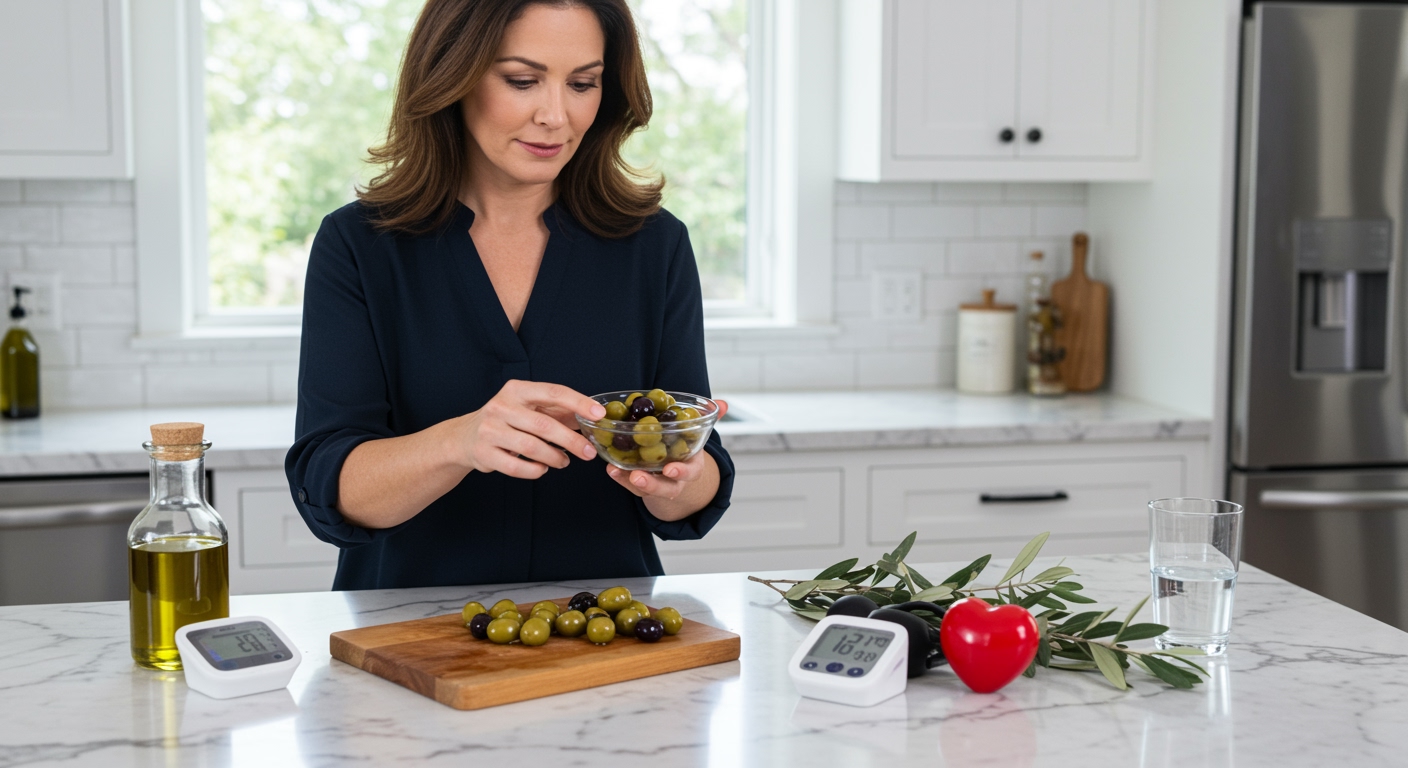✪ Key Takeaway: Olives contain heart-protective compounds that may help lower blood pressure despite their sodium content.
Introduction
You reach for that jar of olives in your pantry and pause.
Your doctor told you to watch your sodium intake because of your high blood pressure, and olives seem loaded with salt.
Hi, I’m Abdur, your nutrition coach, and today I’m going to explain whether olives can actually help or hurt your blood pressure goals.
What Makes Olives Special for Heart Health?
Olives contain powerful polyphenols that work like tiny shields protecting your blood vessels.
These natural compounds help your blood vessels stay flexible and responsive to changes in blood flow.
The main polyphenol in olives is called hydroxytyrosol, which acts as a potent antioxidant in your cardiovascular system.
Research shows that hydroxytyrosol can help reduce inflammation in your artery walls.
When your arteries are less inflamed, they can relax more easily, which naturally lowers the pressure inside them.
Olives also provide healthy monounsaturated fats that support overall heart function and help maintain proper blood vessel structure.
✪ Fact: Green olives contain higher levels of polyphenols than black olives due to their earlier harvest time.
How Does Sodium in Olives Affect Blood Pressure?
The sodium concern with olives is real but often misunderstood in context.
Most commercial olives contain about 150-300 milligrams of sodium per serving of 5-10 olives.
This sodium comes from the brining process used to remove the natural bitterness from raw olives.
However, the total sodium content in a typical olive serving is much lower than many processed foods people eat daily.
Your body needs some sodium to maintain proper fluid balance and nerve function, but the key is staying within healthy limits.
The American Heart Association recommends limiting sodium to 2,300 milligrams per day, with an ideal target of 1,500 milligrams for people with high blood pressure.
A serving of olives represents only about 10-15% of your daily sodium budget, leaving plenty of room for other foods when you plan your meals wisely.
✪ Pro Tip: Rinse canned or jarred olives under cold water for 30 seconds to reduce their sodium content by up to 40%.
What Does Research Say About Olives and Blood Pressure?
Studies on Mediterranean populations show consistently lower rates of high blood pressure despite regular olive consumption.
A 2014 study published in the American Journal of Hypertension found that people following a Mediterranean diet rich in olives had better blood pressure control than those on low-fat diets.
The researchers discovered that the polyphenols in olives help improve endothelial function, which is how well your blood vessel walls respond to changes in blood flow.
Another study showed that consuming olives regularly can help reduce both systolic and diastolic blood pressure readings over time.
The key finding was that the beneficial compounds in olives seemed to outweigh the negative effects of their sodium content.
Scientists believe this happens because the polyphenols help your kidneys process sodium more efficiently, preventing it from raising your blood pressure as much as it would otherwise.
✪ Note: Most olive studies focus on whole Mediterranean dietary patterns rather than isolated olive consumption.
How Should You Include Olives in Your Diet?
The smart approach is treating olives as a flavorful addition rather than a main component of your meals.
Start with 5-8 olives per day and monitor how your body responds over several weeks.
Choose olives that are minimally processed and avoid varieties with added artificial preservatives or excessive seasonings.
Look for olives stored in simple brine solutions or olive oil rather than those with complex ingredient lists.
Balance your olive intake with other potassium-rich foods like bananas, spinach, and sweet potatoes to help counteract sodium effects.
Consider using olives to replace higher-sodium snacks like chips or crackers, which can help improve your overall sodium balance.
Remember that consistency matters more than quantity when it comes to getting cardiovascular benefits from any food.
✪ Pro Tip: Add olives to salads or grain bowls instead of eating them alone to maximize their heart-protective benefits.
The Bottom Line
Olives can be part of a blood pressure-friendly diet when consumed in reasonable amounts and as part of an overall healthy eating pattern.
The best foods for your health are those that provide multiple benefits while fitting into your daily nutritional goals.
I would love to hear about your experience with olives and blood pressure management, so please share your thoughts or questions in the comments below.
References
At NutritionCrown, we use quality and credible sources to ensure our content is accurate and trustworthy. Below are the sources referenced in creating this article:
- American Journal of Hypertension: Mediterranean Diet and Blood Pressure
- Cleveland Clinic: Are Olives Good for You
- PMC: Olive Polyphenols and Cardiovascular Health
- American Heart Association: Hypertension Research





